陈述句疑问句祈使句感叹句
- 格式:doc
- 大小:68.50 KB
- 文档页数:9

现代汉语四种常见句式及特点
现代汉语中常见的四种句式包括:陈述句、疑问句、祈使句和感叹句。
以下是它们的定义和特点:
1.陈述句:用来陈述事实或观点的句子。
它通常以句号结尾,没有语气词,例
如“我喜欢阅读。
”
2.疑问句:用来提出问题的句子。
它通常以问号结尾,有疑问词或疑问语气词,
例如“你最喜欢的书是什么?”
3.祈使句:用来发出命令或请求的句子。
它通常以感叹号结尾,没有主语,例
如“请安静!”
4.感叹句:用来表达强烈感情的句子。
它通常以感叹号结尾,没有语气词,例
如“多么美丽的景色啊!”
这四种句式各有不同的用途和表达效果,可以在写作和口语中灵活运用。
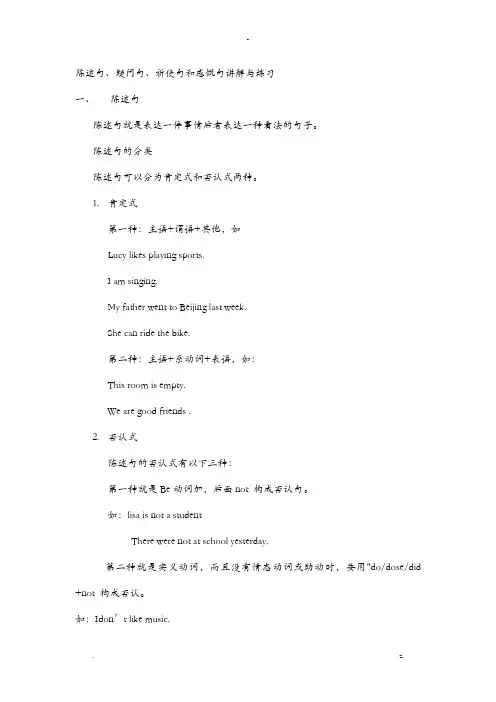
陈述句、疑问句、祈使句和感慨句讲解与练习一、陈述句陈述句就是表达一件事情后者表达一种看法的句子。
陈述句的分类陈述句可以分为肯定式和否认式两种。
1.肯定式第一种:主语+谓语+其他,如Lucy likes playing sports.I am singing.My father went to Beijing last week.She can ride the bike.第二种:主语+系动词+表语,如:This room is empty.We are good friends .2.否认式陈述句的否认式有以下三种:第一种就是Be动词加,后面not 构成否认句。
如:lisa is not a studentThere were not at school yesterday.第二种就是实义动词,而且没有情态动词或助动时,要用"do/dose/did +not 构成否认。
如:Idon’t like music.The farmer did not want to feed the rabbit.第三种:谓语动词为"助动词、情态动词+实义动词〞时,要用"助动词/情态动词+not〞构成否认。
如:I am not going to play puter games.Harry must not go to school at night.We can not go hiking with you this weekend.二、疑问句分为四种:一般疑问句、特殊疑问句、选择疑问句和反义疑问句。
1.一般疑问句通常以be ,have ,助动词或情态动词开头,答复时用Yes, No, 朗读时要用升调。
2.特殊疑问句是对句子*一局部的疑问句。
特殊疑问句的句式是:特殊疑问词+一般疑问句。
疑问词有who, whom , whose , what, when, why , where ,how 等。

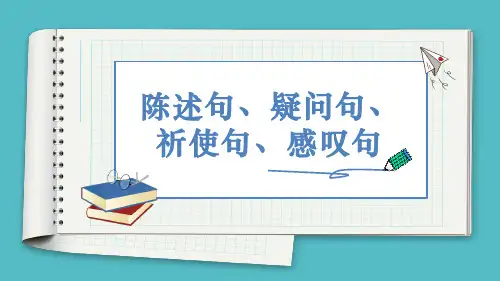
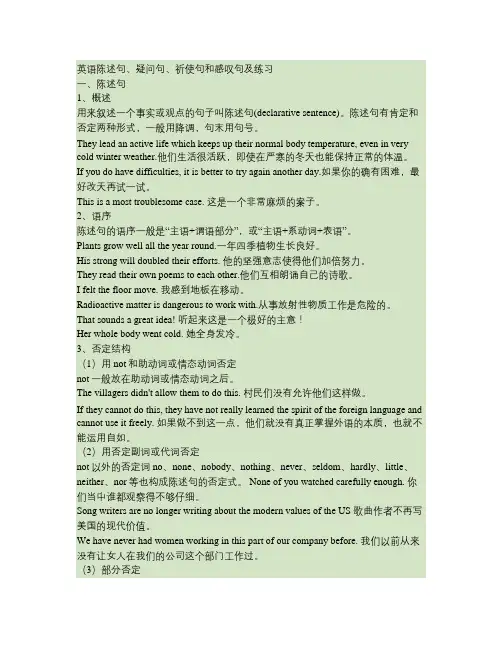
英语陈述句、疑问句、祈使句和感叹句及练习一、陈述句1、概述用来叙述一个事实或观点的句子叫陈述句(declarative sentence)。
陈述句有肯定和否定两种形式,一般用降调,句末用句号。
They lead an active life which keeps up their normal body temperature, even in very cold winter weather.他们生活很活跃,即使在严寒的冬天也能保持正常的体温。
If you do have difficulties, it is better to try again another day.如果你的确有困难,最好改天再试一试。
This is a most troublesome case. 这是一个非常麻烦的案子。
2、语序陈述句的语序一般是“主语+谓语部分”,或“主语+系动词+表语”。
Plants grow well all the year round.一年四季植物生长良好。
His strong will doubled their efforts. 他的坚强意志使得他们加倍努力。
They read their own poems to each other.他们互相朗诵自己的诗歌。
I felt the floor move. 我感到地板在移动。
Radioactive matter is dangerous to work with.从事放射性物质工作是危险的。
That sounds a great idea! 听起来这是一个极好的主意!Her whole body went cold. 她全身发冷。
3、否定结构(1)用not和助动词或情态动词否定not一般放在助动词或情态动词之后。
The villagers didn't allow them to do this. 村民们没有允许他们这样做。
If they cannot do this, they have not really learned the spirit of the foreign language and cannot use it freely. 如果做不到这一点,他们就没有真正掌握外语的本质,也就不能运用自如。
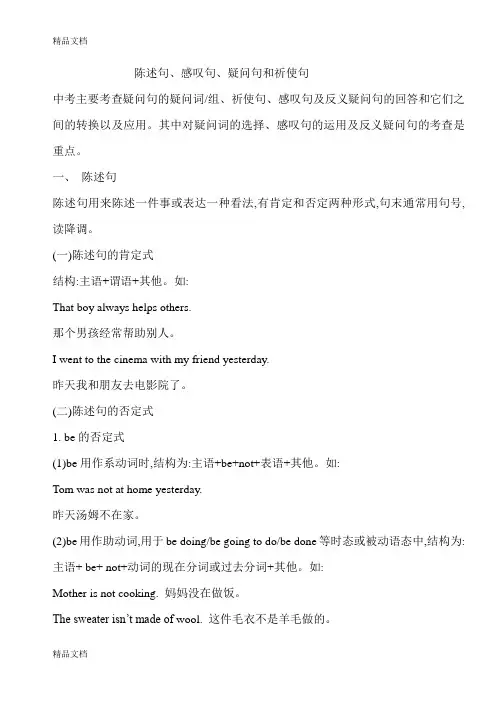
陈述句、感叹句、疑问句和祈使句中考主要考查疑问句的疑问词/组、祈使句、感叹句及反义疑问句的回答和它们之间的转换以及应用。
其中对疑问词的选择、感叹句的运用及反义疑问句的考查是重点。
一、陈述句陈述句用来陈述一件事或表达一种看法,有肯定和否定两种形式,句末通常用句号,读降调。
(一)陈述句的肯定式结构:主语+谓语+其他。
如:That boy always helps others.那个男孩经常帮助别人。
I went to the cinema with my friend yesterday.昨天我和朋友去电影院了。
(二)陈述句的否定式1. be的否定式(1)be用作系动词时,结构为:主语+be+not+表语+其他。
如:Tom was not at home yesterday.昨天汤姆不在家。
(2)be用作助动词,用于be doing/be going to do/be done等时态或被动语态中,结构为:主语+ be+ not+动词的现在分词或过去分词+其他。
如:Mother is not cooking. 妈妈没在做饭。
The sweater isn’t made of wool. 这件毛衣不是羊毛做的。
2. 助动词、情态动词的否定式The girl doesn’t do housework at home.这个女孩在家不做家务。
Man can’t live without water.没有水人类不能生存。
3. 除not外,其他否定词也可以构成否定句(1)用no表示,no=not any/a。
如:He has no child.=He doesn’t have any children.他没有孩子。
(2)never绝不,从来不。
如:I have never seen such a strange man.我从没见过这样奇怪的人。
(3)little, few几乎没有。
如:There are few students in the crowd.人群里几乎没有学生。
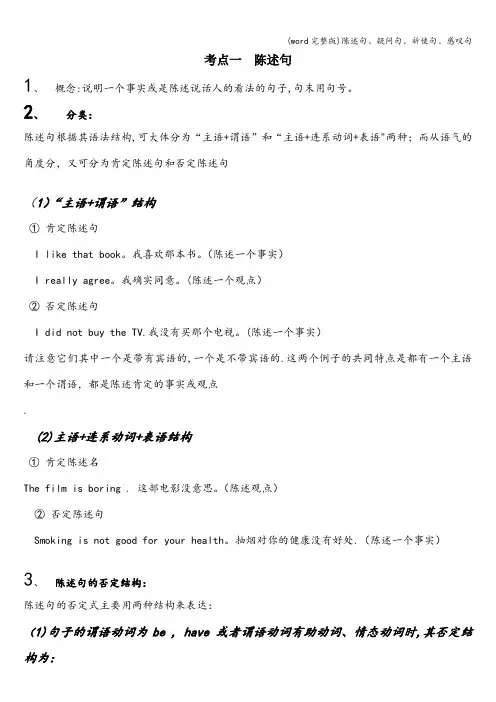
考点一陈述句1、概念:说明一个事实或是陈述说话人的看法的句子,句末用句号。
2、分类:陈述句根据其语法结构,可大体分为“主语+谓语”和“主语+连系动词+表语"两种;而从语气的角度分,又可分为肯定陈述句和否定陈述句(1)“主语+谓语”结构①肯定陈述句I like that book。
我喜欢那本书。
(陈述一个事实)I really agree。
我确实同意。
(陈述一个观点)②否定陈述句I did not buy the TV.我没有买那个电视。
(陈述一个事实)请注意它们其中一个是带有宾语的,一个是不带宾语的.这两个例子的共同特点是都有一个主语和一个谓语,都是陈述肯定的事实或观点.(2)主语+连系动词+表语结构①肯定陈述名The film is boring . 这部电影没意思。
(陈述观点)②否定陈述句Smoking is not good for your health。
抽烟对你的健康没有好处.(陈述一个事实)3、陈述句的否定结构:陈述句的否定式主要用两种结构来表达:(1)句子的谓语动词为be , have 或者谓语动词有助动词、情态动词时,其否定结构为:主语+谓语动词/助动词/情态动词 + not + 其他成分I am not a teacher。
我不是老师。
We have not (haven`t) any books on animals。
我们没有任何有关动物方面的书。
The children are not (aren`t) playing in the playground. 孩子们没在操场上玩.He will not (won`t) come. 他不会来。
We must not (mustn`t) forget the past. 我们不能忘记过去.It could not (couldn`t) be lost。
它不可能丢的.(2)当句子的谓语动词是do (即行为动词),而且没有助动词或情态动词时,其否定结构为:主语+do (does,did) + not + 动词原形 + 其他成分You do not (don`t) come here every day 。
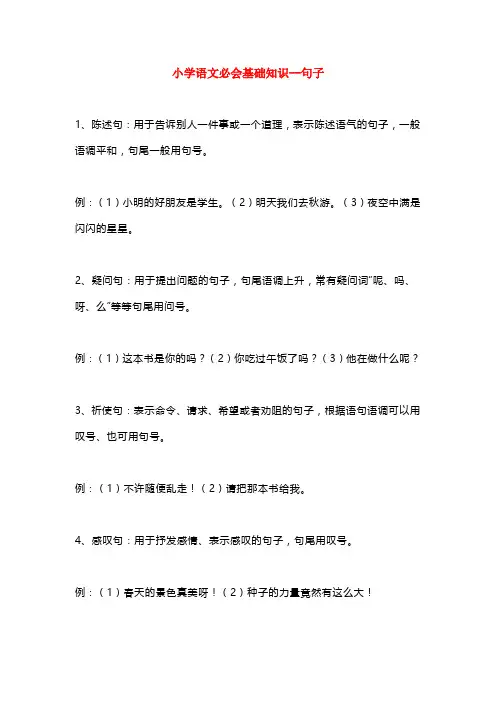
小学语文必会基础知识--句子
1、陈述句:用于告诉别人一件事或一个道理,表示陈述语气的句子,一般语调平和,句尾一般用句号。
例:(1)小明的好朋友是学生。
(2)明天我们去秋游。
(3)夜空中满是闪闪的星星。
2、疑问句:用于提出问题的句子,句尾语调上升,常有疑问词“呢、吗、呀、么”等等句尾用问号。
例:(1)这本书是你的吗?(2)你吃过午饭了吗?(3)他在做什么呢?
3、祈使句:表示命令、请求、希望或者劝阻的句子,根据语句语调可以用叹号、也可用句号。
例:(1)不许随便乱走!(2)请把那本书给我。
4、感叹句:用于抒发感情、表示感叹的句子,句尾用叹号。
例:(1)春天的景色真美呀!(2)种子的力量竟然有这么大!。

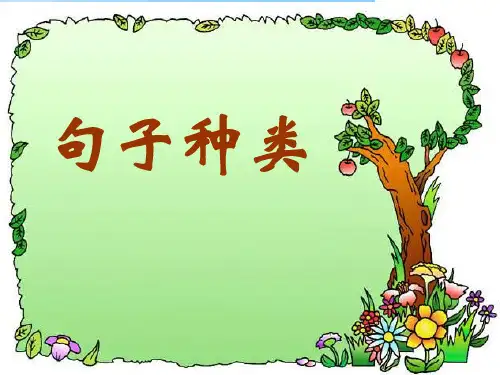

英语句子的分类
英语句子类型按句子的用途分为四种:陈述句、疑问句、祈使句、感叹句。
1、陈述句(Declarative Sentence)是陈述一个事实或者说话人的看法的句型。
陈述句又分为肯定的陈述句和否定的陈述句,简称为肯定句(The Affirmative Sentence)和否定句(The Negative Sentence)。
2、疑问句是按照句子的语气分出来的一个类,它与陈述句、感叹句、祈使句的最大区别就是它的疑问语气;是问一些事情的,表达的内容并不是陈述,所以是不确定的;主要有四大句型,一般疑问句、选择疑问句、特殊疑问句和反意疑问句。
3、祈使句(Imperative Sentence)是英语中的一个句式,也是用于表达命令、请求、劝告、警告、禁止等的句子。
祈使句最常用于表达命令,因此在学校文法中也常称为命令句。
4、感叹句有多种表现形式,有时一个单词、短语或一个词组也可成为感叹句。
有时陈述句、疑问句以及祈使句也可以转化成感叹句。
句子有哪几种形式篇一:句子有哪几种形式?句子是语言表达的基础单元,它是语言的基本构成要素之一。
句子的形式有很多种,不同种类的句子在语法上都有各自的特征和构造。
本文将介绍句子的几种常见形式,并对其进行分析。
一、简单句简单句是由一个独立的主语和谓语构成的完整表达,是最基本、最简单的句子形式。
简单句又可分为陈述句、疑问句、祈使句和感叹句四种。
1.陈述句:表示说话人对事情或观点的陈述或描述,使用陈述语序。
例如:我喜欢猫。
他是一名老师。
2.疑问句:表示问句的句子,用于提问或请求信息,使用疑问语序。
例如:你会游泳吗?这是什么?3.祈使句:表示命令或请求的句子,使用祈使语序。
例如:别吵了。
请过来一下。
4.感叹句:表达惊讶、愉悦、悲痛等情感的句子,使用感叹语序。
例如:多么美丽的风景啊!真是一场好戏啊!二、复合句复合句是由两个或两个以上分句构成的句子,分句之间有一定的关联关系。
复合句又可分为并列句、主从句和独立主语句三种。
1.并列句:是由两个或两个以上的并列分句构成的句子,分句之间的关系是并列关系。
例如:他赚了钱,但没有花。
2.主从句:是由一个主分句和一个或多个从分句构成的句子,从分句对主分句发生修饰或叙述关系。
例如:我不知道他什么时候来。
他来了我就告诉你。
3.独立主语句:由两个或两个以上用and、or、but等连接的并列短语组成,每个短语中都有一个主语,但各独立存在。
例如:张三去了北京,李四回了上海,王五去了广州。
三、复杂句复杂句是由一个主句和一个或多个从句构成的句子,从句互相联系,起到修饰、限定、说明主句内容的作用。
例如:他在天安门上升国旗时,感到非常自豪。
以上是句子的几种常见形式,有了对句子形式的了解,我们在日常语言交流中便能更准确地表达自己的意思,同时还有助于我们对语言的理解和语法知识的掌握。
知识点分析:1.陈述句、疑问句、祈使句和感叹句是简单句的几种形式,表达方式和语序都不相同。
掌握不同形式的句子,能够准确表达自己想要表达的内容,提高语言表达能力。
一、句子按功能分可分为陈述句、疑问句、祈使句和感叹句陈述句陈述句的定义:陈述句主要是用来传递信息,提供情况(包括肯定和否定的情况)。
China is the largest country in Asia.I'm going to see a film. 我打算去看电影。
I'm not going to see a film. 我不打算去看电影。
She has arrived. 她已经到达。
She hasn't arrived yet. 她还没有到达。
He teaches English. 他教英语。
He doesn't teach English. 他不教英语。
He has some money left. 他还剩一点钱。
He hasn't any money left. 他分文不剩。
祈使句表示请求、命令、禁止、劝告或建议的句子叫祈使句。
祈使句的主语往往省略。
其常见的句式结构可归纳为四种基本形式:(1)肯定祈使句;(2)否定祈使句;(3)以Let’s开头的祈使句;(4)以助动词do开头的祈使句。
1.肯定祈使句。
如:Stop talking! Come here in time!2.否定祈使句,即以Don’t或Never开头的句子。
如:Don’t talk in class. Never leave today’s work for tomorrow.3.以Let’s 开头的句子。
如:Let’s go together. Let him go first.4.以助动词do开头的祈使句,在句中起加强语气的作用,译成“一定,务必”。
如:Do come to see me if you have time.感叹句含有表示情绪色彩的词的句子叫感叹句。
感叹句的结构通常有三种形式:(1)what引导的感叹句,强调句中的名词;(2)how引导的感叹句、强调句中的形容词或副词;(3)由感情色彩的单词或词组构成的感叹句。
句子(陈述句,疑问句,感叹句,祈使句)一、陈述句:是用来陈述一件事情或表示一种看法,可分为肯定句和否定句两种形式。
1、谓语动词是be动词,助动词have, has, will,情态动词can等时,只要直接在这些词后面加not就构成否定形式。
eg. Lily has already read this new book. (改为否定句)Lily ______ ______ this new book ________.2、谓语动词是行为动词而又没有助动词或情态动词时,必须在谓语动词前加助动词,一般现在时加助动词do ,第三人称单数加does,一般过去时加did,再和not构成否定结构。
必须指出的是:don't, doesn't, didn't后都用动词原形。
eg.1)Jill has lunch at school every day. (改为否定句)Jill _____ _____ lunch at school every day.2)The children had a good time at the party. (改为否定句)The children ______ _____ a good time at the party.3)Rose didn't drink any milk this morning.(改为肯定句)Rose ______ ______ milk this morning.二、疑问句:是用来提出问题的句子。
A.一般疑问句:以be动词, have /has/do等助动词、can/may等情态动词开头,以yes或no来回答的问句。
它的基本结构是:Be/Have /Has/Did等助动词(包括情态动词)+主语+谓语(包括表语)+┄?回答常用简略回答。
1、谓语动词是be动词、助动词、情态动词时,只要直接把这些词置于句首,句末改成问号。
eg. There's something wrong with his bike.(改成疑问句)______ _____ _______ wrong with his bike?2、谓语动词是行为动词时,必须在句首加上助动词Do、Does(三单)、Did(过去式)加上这些助动词后,句子中谓语动词必须用原形。
eg. 1)Edison built a science lab himself when he was ten. (改成疑问句)______ Edison ______ a science lab himself when he was ten?2)Those Japanese like Chinese food.(改成疑问句)______ those Japanese ________ Chinese food?注意:在把肯定句改成否定句或一般疑问句的时候,要注意句中是否有already、s ome、something、somebody等词,如果有也必须进行改变,already要改成yet,some、something、somebody等分别改成any、anything、anybody等。
另外,在改成否定句的时候注意把too改成either,both改成neither,all改成none等.在改成一般疑问句的时候,常常把第一人称I、we改成第二人称you。
B.特殊疑问句:以疑问代词或疑问副词开头,提出疑问的句子。
它的基本结构是:特殊疑问词+一般疑问句语序。
但是如果疑问词在句子中作主语或作主语的定语,就用特殊疑问词+陈述句语序。
常用的疑问词有:what, wh o(whom), whose,which,when,where,how,why等,回答时针对问句中的代词和副词来回答,不用yes或no来回答。
1)对指物名词或谓语动词提出疑问,疑问词用what①The twins were making a kite when their mother came in. (划线提问)______ _____ the twins _____ when their mother came in?②Mrs Turner asked her son to buy some eggs for supper. (划线提问)_______ ______ Mrs Turner ask her son ______ _______?2)对名词前定语提出疑问,疑问词应用which,而且必须和名词连用。
I'm going to take the shirt on the right.(划线提问)______ _____ are you going to take?3)对指人名词或代词提问用who,作宾语时提问用whom。
eg.Li Ping,they,his father4)对物主代词和名词所有格提问用whose。
eg. Li Ping's coat→Whose coat my father→Whose father5)对具体时间提出疑问,如in the morning,last Sunday等,疑问词用when;对具体几点钟提问,疑问词应用what time。
6)对具体地点提出疑问,疑问词应用where。
The pupils are having a picnic at the foot of the hill. (划线提问)_____ _____ the pupils having a picnic?7)对表原因的从句提问,常见的有because引导的从句,疑问词应用why。
Xiao Cheng didn't go to the farm with us because he was ill. (划线提问)_______ _____ Xiao Cheng go to the farm with us?8)对方式或程度等提出疑问,用疑问词How。
eg. go by bike like very much9)对数量提出疑问,疑问词为How many,要注意how many必须跟名词的复数形式。
eg. two hundred sheep→How many sheep10)对价格提出疑问,疑问词用How much。
eg. I paid fifty yuan for the sweater.______ ______ did you pay for the sweater?11)对时间长度提出疑问,疑问词应用How long。
eg. I've worked in that factory for two years. (划线提问)______ _____ _______ you worked in that factory?12)对时间频率,如once a year, twice a week等提问,疑问词用How often。
13)对具体次数,如once, twice, three times等提问,疑问词用How many time s。
eg. ______ did he call you the day before yesterday?Twice.A.What timeB.How many timesC.How muchD.How long14)对in+一段时间提问,疑问词一般用How soon。
eg. Jane and her brother will finish the work in two hours. (划线提问)_____ _____ _____ Jane and her brother finish the work?15)对距离提出疑问,疑问词用How far。
eg. It's about two kilometres from here to the country.(划线提问)______ _____ _____ _____ from here to the country?16)另外,对日期、星期、天气等提出疑问,则分别用What's the date?What day is it ? 如果是过去时间,就用was代替is。
What's the weather like?练习题1)She does exercises at home in the evening.(改成否定句、一般疑问句)She ______ ______ exercises at home in the evening.______ she _____ exercises at home in the evening?2)He said something important at the meeting.(改为否定句,一般疑问句)He _____ ______ ______ important at the meeting.______ he ______ ______ important at the meeting?3)It'll take them three weeks to finish the work.(划线提问)______ ______ _______ it take them to finish the work?4)I have to wash all the plates and things after meals.(划线提问)_____ _____ you have to wash all the plates and things?5)The woman in the red coat is her mother.(划线提问)______ ______ is her mother?6)Li Ping spent twenty yuan on the dictionary.(划线提问)_____ ____ ____ Li Ping _____ on the dictionary?思考题1)The worker's visited the factory already.(改成否定句、一般疑问句)The worker _____ _____ the factory ______.____ the worker ___ the factory __?2)Both of his parents are workers.(改成否定句)___ of his parents ______ a worker.3)He went to the park with his sister.(划线提问)_____ ____ ____ he go to the park?4)We really enjoyed working on the farm.(划线提问)What _____ you really enjoy ______?5)She writes to her parents once a week.(划线提问)_______ ______ ______ she write to her parents?6)Our P.E teacher has been at this school since he came.(划线提问)______ ______ ______ our P.E teacher been at this school?C.选择疑问句:指提问者提供两种或两种以上情况,让对方从中作出选择的句子。